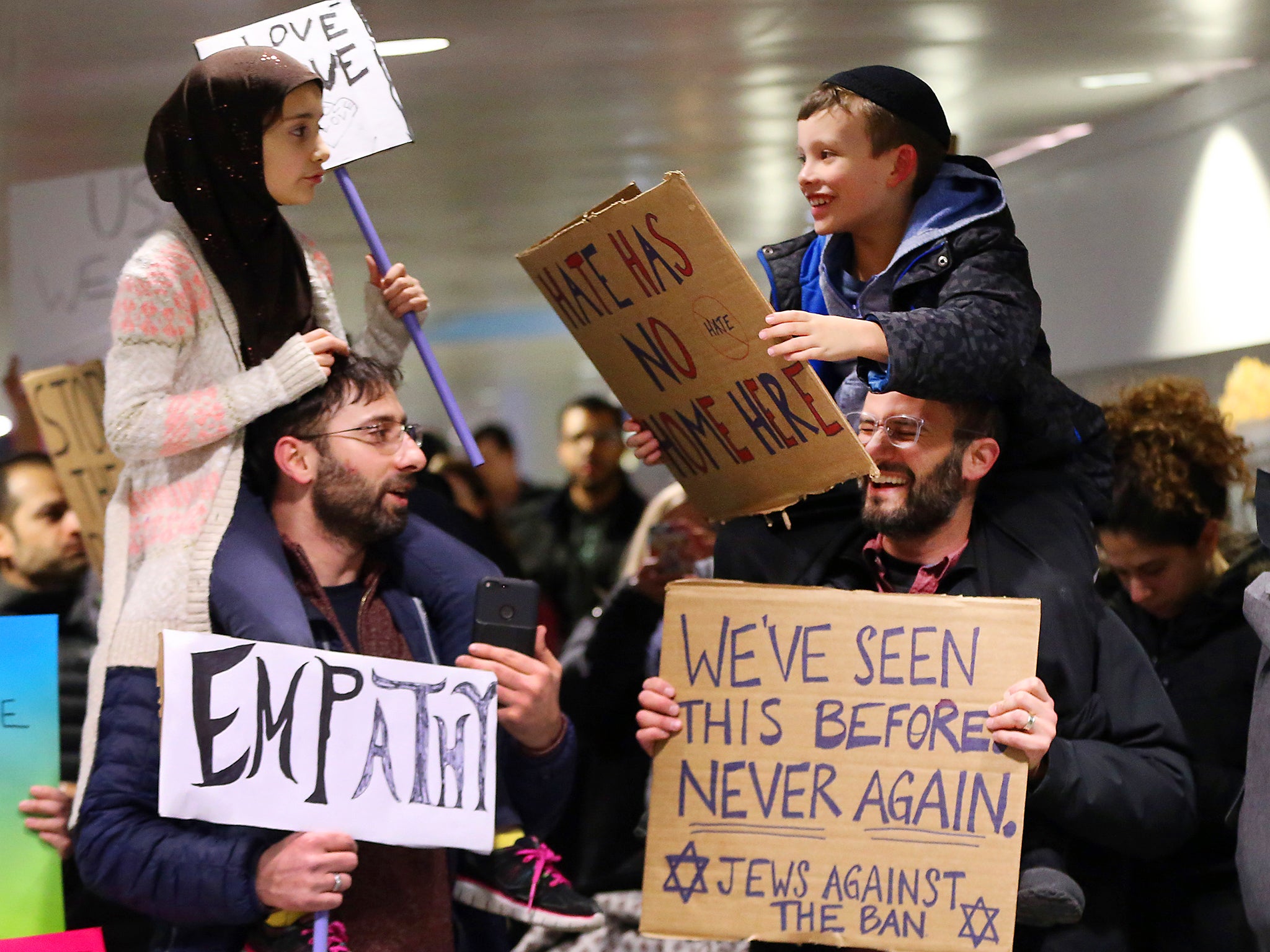The Independent's journalism is supported by our readers. When you purchase through links on our site, we may earn commission.
Donald Trump has managed to unite Muslims and Jews in a way that few have ever managed to do
Trump's Muslim ban was painfully evocative of Jewish stories of migration to the US – or tragic accounts of family members denied entry to the US as refugees, only to be killed in the Holocaust. Dozens of rabbis were recently arrested while demonstrating against the ban outside Trump Tower


Your support helps us to tell the story
From reproductive rights to climate change to Big Tech, The Independent is on the ground when the story is developing. Whether it's investigating the financials of Elon Musk's pro-Trump PAC or producing our latest documentary, 'The A Word', which shines a light on the American women fighting for reproductive rights, we know how important it is to parse out the facts from the messaging.
At such a critical moment in US history, we need reporters on the ground. Your donation allows us to keep sending journalists to speak to both sides of the story.
The Independent is trusted by Americans across the entire political spectrum. And unlike many other quality news outlets, we choose not to lock Americans out of our reporting and analysis with paywalls. We believe quality journalism should be available to everyone, paid for by those who can afford it.
Your support makes all the difference.A few weeks ago, Saturday night subway commuters in New York met with the sight of swastikas daubed onto their train‘s walls – and set about collectively removing them, appropriately enough, with hand sanitisers.
It wasn’t the first sighting of swastikas in New York since Donald Trump was elected President. But it came days after the White House intentionally omitted mention of Jewish victims in the President’s Holocaust Remembrance Day message. On that same day, Trump issued his ban on refugees and anyone from seven majority-Muslim countries. Put together, as these things have been, the Trump administration has united Muslim and Jewish communities in a way that few could manage.
Jewish American solidarity over the Muslim ban is no surprise: the measure, and its devastating effects, were painfully evocative of Jewish stories of migration to the US – or tragic accounts of family members denied entry to the US as refugees, only to be killed in the Holocaust.
Jewish organisations, as well as religious groups spanning liberal and Orthodox communities, were quick to condemn the ban and take part in protests. Dozens of rabbis were recently arrested while demonstrating against the ban outside Trump Tower in Manhattan. One of them, Jill Jacobs, told The New York Times: “We know that some of the language that’s being used now to stop Muslims from coming in is the same language that was used to stop Jewish refugees from coming.”
This unity flows in both directions: the Council of American Islamic Relations (Cair), as well as fighting the Muslim ban, has come out in support of Jewish communities after incidents of hate vandalism – echoing similar expressions of solidarity taking place in US neighbourhoods. Just after Trump’s election, a new Muslim-Jewish advisory council was formed to tackle both anti-Semitism and Islamophobia, while existing grassroots organisations premised on joint Muslim-Jewish action have reported a surge in interest.
The solidarity has gained momentum because of the combination of the Muslim ban and the anti-Semitism unleashed as a result of Trump’s election – the bomb threats to Jewish community centres, the rise in anti-Semitic incidents, all those swastikas in the streets. The whole thing seems to spell out in bold what had previously been in the subtext: for the far right, anti-Semitism and Islamophobia go hand-in-hand.
This has already been tracked in Europe where, in the post-9/11 period, far-right parties opportunistically swapped one hatred for another in a rehabilitation exercise. A resurgent populist right clocked that scapegoating Muslims and scaremongering over “Islamification” could bring electoral gain where anti-Semitism had long become unacceptable.
By 2010, far-right figures such as the Dutch Party for Freedom leader Geert Wilders were canvassing for Jewish endorsements (another image-scrubbing tactic) by talking up support for Israel as a vanguard in a broader Judeo-Christian battle against “fundamentalist Islam”. Welcomed by some of Israel’s hard-right government, Wilders described the country as a front-line fighter, warning: "If Jerusalem falls, Amsterdam and New York will be next." Last year, the leader of Austria’s Freedom Party, founded by former Nazis, was unofficially welcomed in Israel by members of the coalition government’s Likud party.
Trump’s chief of staff Stephen Bannon, who previously ran the extreme right Breitbart website, which trades in white supremacy and anti-Semitism, has also talked of a “Judeo-Christian war”. And he has cast the American Jewish community (along with the media, universities and “the left”) as unwitting enablers of jihad. This gets to what one progressive Jewish American described to me as “old school anti-Semitism, reloaded”: once, American Jewry was blamed for communism; it now stands accused of facilitating violent Islamist extremism.
As with the far right in Europe, Team Trump’s support for Israel is a fig leaf. Explaining why the president’s Holocaust Remembrance Day message removed references to anti-Semitism, White House press secretary Sean Spicer swiftly pivoted to this subject, noting: “In respect to, you know, Israel and the Jewish people specifically, there’s been no better friend than Donald Trump when it comes to protecting Israel.”
But being pro-Israel, in this context, clearly does not preclude anti-Semitism. When some nativist far-rightists support Israel, that’s because they are equal-opportunity ethno-nationalists – promoting the ideology both domestically and globally. To put it bluntly, this sort of “support” for Israel creepily carries the sense that Jewish people are terrific – in their own country. Just not so much when they presume to live elsewhere.
All of which has created clarity of purpose among those who may previously have been divided over the Israeli-Palestinian conflict. Cheerleading for a hard-right version of Israel, from the far-right end of the spectrum with its tones of anti-Semitism, can now be unequivocally named as a harmful convenience, a toxic roadblock thrown in the path of potentially powerful community alliances. If the past few weeks in the US are anything to go by, Jewish and Muslim communities are, now more than ever, inclined to jump over it.
Join our commenting forum
Join thought-provoking conversations, follow other Independent readers and see their replies
Comments